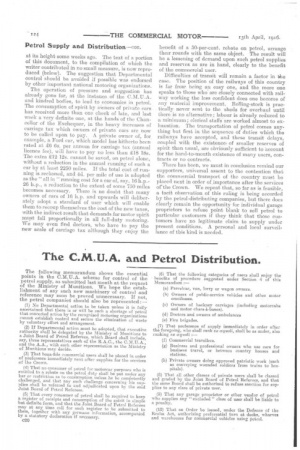The C.M,U.A. and Petrol Distribution.
Page 2

If you've noticed an error in this article please click here to report it so we can fix it.
The following memorandum shows the essential points in the C.M.U.A. scheme for control of the petrol supply, as submitted last month at the request of the Ministry of Munitions. We hope the establishment of any such new machinery of control and reference may soon be proved unnecessary. If not, the petrol companieg should also be represented :—
(1) No Departmental action to be taken unless it is fully ascertained that there is or will be such a shortage of petrol that concerted action by the recognized motoring organizations cannot establish control and secure the elimination of waste by voluntary effort and arrangement.
(2) If Departmental action must be adopted, that executive authority shall be delegated by the Ministry of Munitions to a Joint Board of Petrol Referees, which Board shall include, say, three representatives each of the R.A.C., the C.M.11.A., and the A.A., with such other representation as the Ministry of Munitions may decide.
(3) That bona-fide commercial users shall he placed in order of preference immediately next after supplies for the services of the Crown.
(4) That no consumer of petrol for motorcar purposes who is entitled to a rebate on the petrol duty shall be put under any bar or restriction as to consumption unless he be comPetently challenged, and that any such challenge concerning hi a supplies shall be referred to and adjudicated upon by the said Joint Board of Petrol Referees.
(5) That, every consumer of petrol shall be required to keep a register of receipts and consumption of the spirit in simple but definite form, and that the Joint Board of Petrol Referees may at any time call for such register to be submitted to them, together with any ,germane information, accompanied by a, statutory declaration if necessary.
(6) That the following categories of users shall enjoy the benefits of procedure suggested under Section 4 of this Memorandum :— (a) Parrelcar, van, lorry or wagon owners.
(b) Owners of public-service vehicles and other motor omnibuses.
(c) Owners of hackney carriages (including motorcabs and motor chars-a-bancs).
(d) Doctors and owners of ambulances (e) Fire brigades.
(7) That preference of supply immediately in order after the foregoing, who shall rank ex cequali, shall be as under, also ranking ex avoli
(f) Commercial travellers.
(g) Business and professional owners who use cars for businesS travel, or between country houses and stations.
(h) Private owners doing approved patriotic work (such as conveying wounded soldiers from trains to hospitals).
(8) That all other classes of private users shall be classed and graded by the Joint Board of Petrol Referees, and that the same Board shall be authorized to refuse sanction for supplies to any class of private user.
(9) That any garage proprietor or other vendor of petrol who supplies any " excluded " class of user shall be liable to a penalty.
(10) That an Order be issued, under the Defence of the Realm Act, authorizing preferential turn at docks, wharves and warehouses for commercial vehicles using petrol.






















